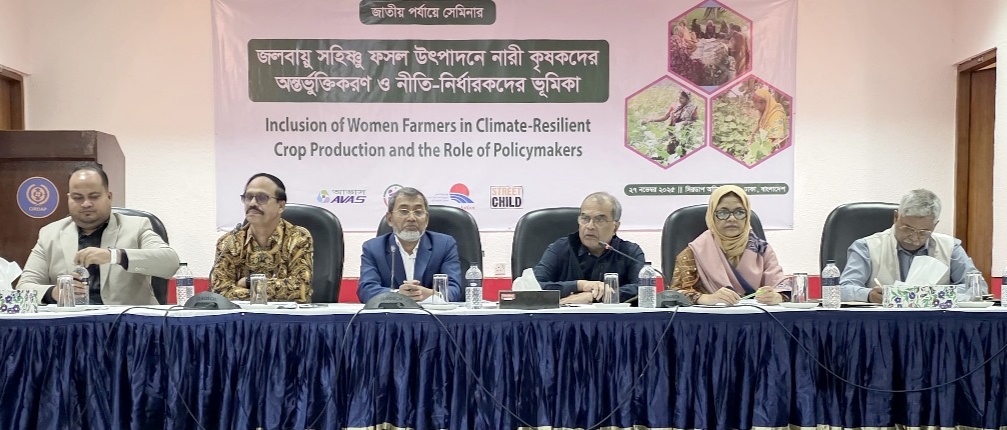01/11/2026

Marginalized coastal women farmers demand recognition
Md. Iqbal Uddin | Published: 2025-11-27 17:16:54

Women constitute 58 percent of the total agricultural workforce in Bangladesh, making them the majority in the sector. Despite this, challenges remain including a lack of recognition, access to government and institutional facilities compared to men and limited access to mechanization.
With only 19 percent of female farmers having agricultural land ownership, but only 4-5 percent can really enjoy it.
Without recognition, women farmers lag behind and denying their human rights; though they are the lifeline of the country’s food security.
The speakers said this during a national-level seminar titled “Inclusion of Women Farmers in Climate-Resilient Crop Production and the Role of Policymakers” organized by AVAS, BINDU, COAST Foundation and Street Child UK today in the capital.
This event was supported by the Gates Foundation and moderated by Rezaul Karim Chowdhury, Executive Director of COAST Foundation. The keynote presentation was delivered by Md. Iqbal Uddin of COAST Foundation.
Distinguished speakers included Agriculturist Dr. Md. Hazrat Ali, Director (in charge)- Crops wing of the Department of Agricultural Extension (DAE); Agriculturist Dr. Md. Jamal Uddin, Additional Director of the DAE; Dr. Radheshyam Sarkar, Former Deputy Director of the DAE; Professor Mir Mohammad Ali, Department of Agriculture, Sher-e-Bangla Agricultural University; Rahima Sultana Kajol, Executive Director, AVAS; Jannatul Mouwa, Executive Director, BINDU; Imtiaz Ridoy, Country Lead, Street Child Bangladesh; Dr. Sohel Iqbal from COAST Foundation; Kawser Rahman from Bangladesh Climate Change Journalist Forum; Salauddin Bablu from SA TV; Md. Motahar Hossain from the Environmental Journalist Forum; AKM Jasim Uddin from ADAB and Mst. Rina Begum, Mst. Asma Begum, Kalpana Rani, and Nazma Begum as the Coastal women farmers representatives from Patuakhali and Satkhira District.
In his keynote speech, Md. Iqbal Uddin highlighted that nearly one-third of Bangladesh’s population lives in coastal areas where climate impacts are most severe. Despite these challenges, coastal women farmers continue to produce climate-resilient crops but remain excluded from government agricultural facilities.
Recognizing and including these farmers is essential to safeguard national food security, he emphasized.
Dr. Md. Hazrat Ali said women farmers in coastal areas are doing hard work for climate-tolerant agriculture production, but they are often paid half the wage compared to men. They also do not get an agricultural loan due to not having ownership in the land. This discrimination should be removed.
Dr. Md. Jamal Uddin stressed the importance of organizing women farmers in groups to collectively claim their rights.
Dr. Radheshyam Sarkar called for the elimination of gender discrimination in the farming sector.
Professor Mir Mohammad Ali emphasized the need for easy access to bank loans, low-interest financing, and timely weather forecasts for women farmers.
Coastal farmer Mst. Rina Begum demanded official recognition and the issuance of Agricultural Cards for women farmers.
Kalpana Rani called for women-friendly agricultural machinery, while Mst. Asma Begum stressed for interest-free or low-interest agricultural loans.
Nazma Begum demanded saline water treatment facilities to support agriculture in coastal regions.
AKM Jasim Uddin underscored the need for gender-responsive agricultural extension service by employing more female workers in it.
Rahima Sultana Kajol highlighted increasing salinity in the Kirtonkhola River, calling it a serious threat to coastal livelihoods and urging immediate mitigation measures.
Jannatul Mouwa demanded enhanced subsidies for women farmers to strengthen climate adaptation in agriculture.
Editor & Publisher : Md. Motiur Rahman
Pritam-Zaman Tower, Level 03, Suite No: 401/A, 37/2 Bir Protik Gazi Dastagir Road, Purana Palton, Dhaka-1000
Cell : (+88) 01706 666 716, (+88) 01711 145 898, Phone: +88 02-41051180-81